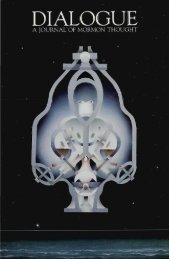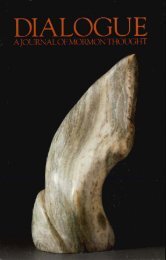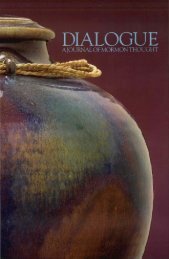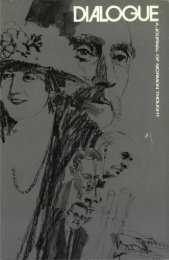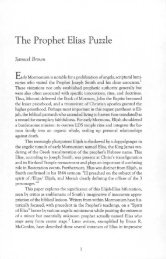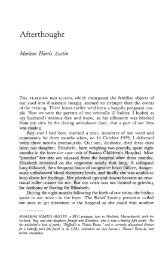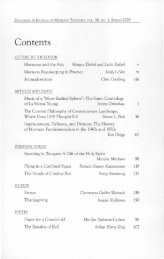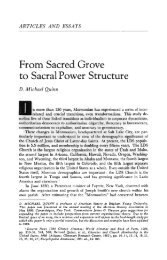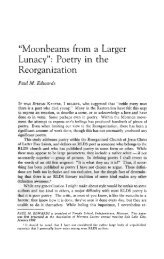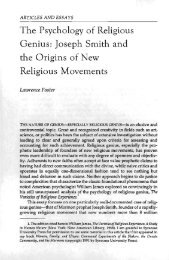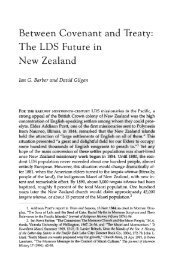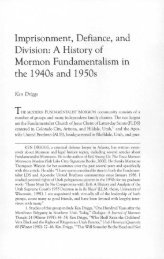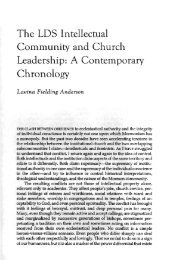Dialogue, Volume 25, Number 2 - Dialogue – A Journal of Mormon ...
Dialogue, Volume 25, Number 2 - Dialogue – A Journal of Mormon ...
Dialogue, Volume 25, Number 2 - Dialogue – A Journal of Mormon ...
Create successful ePaper yourself
Turn your PDF publications into a flip-book with our unique Google optimized e-Paper software.
70 DIALOGUE: A JOURNAL OF MORMON THOUGHT<br />
tions <strong>of</strong> proper behavior and thinking to keep people straight. It requires<br />
a bureaucracy headed by a logic-directed order such as the <strong>Mormon</strong><br />
priesthood organization and Bambara social structure whose members<br />
also fear something — perhaps the exuberance, the unruly desire, even<br />
the climatic moment, <strong>of</strong> women.<br />
All this looking behind must bring us back to the mirror's face;<br />
through scrutiny the self does not disappear into the reflector but<br />
becomes more visible, its qualities magnified. We see then that it is<br />
only the degree <strong>of</strong> any quality or characteristic — hair texture, eye and<br />
skin color, manner <strong>of</strong> dress, body condition, intelligence, need, intellectual<br />
or spiritual freedom — that determines the differences among<br />
people. We know that world cultures, represented by Bambara and<br />
<strong>Mormon</strong>, are not opposite; we, looking like the speckled chickens the<br />
villagers gave us, coexist as black and white together and a bit insensible<br />
from hanging upside-down too long. Certainly we create different<br />
cultures based on circumstance. But we also exaggerate difference<br />
in order to stand apart, to justify hierarchies, to create a special<br />
identity.<br />
Each people must be the Dineh, as the Navajo call themselves:<br />
The People. Each must be, like the Jews, the Chosen. Each must<br />
follow, like the Muslims, the Prophet <strong>of</strong> the One True God. Each<br />
must inherit, like us, the Church <strong>of</strong> the Sign <strong>of</strong> the Greatest Good, for<br />
us Jesus Christ. The need to be special is why many Bambara women<br />
support the sexual excisions, a Malian female friend confides: they see<br />
their absent genitals as the sign <strong>of</strong> a "true" woman, a Bambara woman<br />
courageously facing pain and physically distinct, in a secretive, personal<br />
way, from a white Western woman. For similar reasons —to set<br />
themselves apart and to confirm oaths <strong>of</strong> fealty — <strong>Mormon</strong> men and<br />
women wear garments with their own hidden markings. And in order<br />
to feel securely embraced by the eternally protective aura <strong>of</strong> their religious<br />
leaders, most <strong>Mormon</strong> women, even the "liberated" ones, actively<br />
support their own subjugation. All people desire to assert an agency, a<br />
subjectivity that declares we not only exist but are absolutely essential<br />
to life and truth. A collective subjectivity, provided by membership in<br />
a community, increases our power. We suffer psychic or physical mutilation<br />
for the privilege <strong>of</strong> belonging.<br />
To merely reflect upon the image in the mirror is not difficult. But<br />
if we would go further and be "intensely reflexive" as denned by<br />
Victor Turner —first look beneath the surface, then probe and analyze<br />
what we see and, most importantly, act upon our knowledge —we must<br />
sincerely ask "Who are we? Who am I?" (Turner 1982, 104). And in<br />
our need to negotiate identity with the people around us, we confront<br />
the three possibilities defined earlier by Gramsci: acquiescence,



